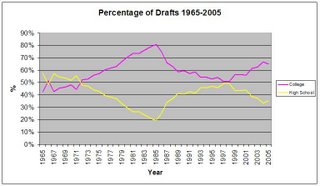Was just alerted to this interesting article titled BASEBALL'S BLACKOUT. It is set to be a multi-part article but the first piece was intriguing for several reasons.
The author's thesis is that "baseball as an industry and as a culture has regressed with a radical blackout harkening to the days of separate but equal". As evidence he cites the facts:
The primary cause that lies behind these facts in the author's opinion is that teams now choose to draft primarily college players and that high school players drafted come from elite travel teams that are cost prohibitive for many African Americans. Further, he suggests that college coaches shy away from recruiting black players "because they fear developing their skills and accepting the social, economic and family responsibilities that often accompany an inner-city athlete."
While college players had been drafted in greater numbers very recently (1998-2004), high school players (as shown in the following graph) were drafted in much greater numbers in the preceding 15 years and so I doubt that the mix of college and high school draftees has much to do with it although certainly the economics of travel teams may play a role.

The unfortunate aspect of the article is that instead of digging deeper into the economic disparity that may help to effectively bar entry or the breakdown of the African American family not to mention the displacement of baseball in the community with basketball and the rise of Latin and Asian players in the last 20 years, the author instead makes some very thinly veiled suggestions that racism is the underlying or root cause. I'm not buying it for the simple reason that our society is surely more open today than it was 40 years ago and yet blacks had seemingly less trouble entering and winning rosters spots. I'm afraid the real causes are probably much more complex than simply racism and have more to do with the characteristics of the African American community and less to do with outside discrimination.

125x125_10off+copy.jpg)



3 comments:
This is indicative of the article:
Johnson, who still does work for the Dodgers' community relations department, was a basketball player at a small college in Kentucky. He was a right-handed hitter and a solid player. Would he get a chance today?
"No way," he said. "I'm a different kind of player. I was a small, right-handed hitting outfielder, who also played basketball at a small college. Today, they wouldn't even look at me."
In the pursuit of the finished product, has baseball pushed away the African-American athlete? It's a challenge to find baseball people who will confront the issue, no matter the color of their skin.
Would Johnson not get a look today because he's black, or bacause he was a "small, right-handed hitting outfielder"?
I agree that more work needs to be done before implying racism in this case.
The key phrases here are the author's statement "Johnson was ... a basketball player at a small college..." and "In the pursuit of the finished product ..." - i.e. he wasn't at a big time program, his time was split with basketball - as a baseball player he wouldn't be as developed or polished. Johnson in answering the author's question introduces the notion of "small right handed outfielder" which presumably means he wouldn't have been seen as a 'tools' player either. I don't think there's any whiff of allegation of racism in this passage.
The natural reading of the article as a whole is a claim that a confluence of developments has had the unintended consequence of reducing the likelihood of African-Americans getting to the major leagues, and a second claim that people in MLB are afraid to speak openly about the issues.
Racism, per se, isn't alleged and isn't required to explain that second claim either.
The dropoff in MLB is not as striking as the dropoff in "big-time" college ball. There can be an unintended consequences explanation here as well, in terms of scholarship availability, changed eligibility requirements and so on, but I think this is an area worthy of much closer investigation.
I agree that he cites other potential causes but in also citing the Campanis incident, in the middle of which he says:
"From high school to the major leagues, the blackout is in effect. Said one African-American major leaguer who wished to remain anonymous: 'It's going back to the way it used to be in the old days.'"
He is clearly planting the suggestion that racism is at work.
Post a Comment